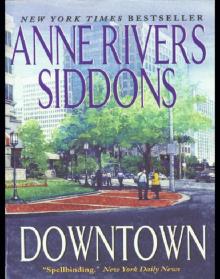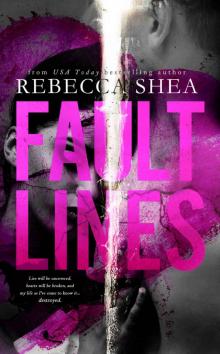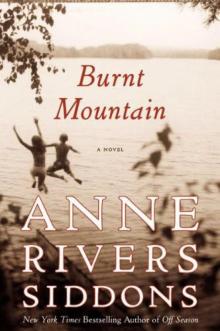- Home
- Anne Rivers Siddons
Burnt Mountain Page 11
Burnt Mountain Read online
Page 11
She kissed me briefly and went out of the room. Her trail was not Vetiver but un Jardin sur le Nil. Even I knew how much that cost. I suddenly remembered the day long ago when I had stolen a bottle of my mother’s Casaque for Lavonda. I smiled with my salt-sticky lips. We’d both come a way since then.
I stayed in my room until it was time to go and see the patron saint of Buckhead maternity. Even walking from the house to the car was misery; the white corona of the sun seemed to lean closer each day. Detritus was sitting in the driver’s seat of my grandmother’s Mercedes, staring straight ahead. I could hear the car’s air-conditioning from the sidewalk. Detritus wore his peaked chauffeur’s cap, though not his livery. My grandmother forbade the livery; it had been my grandfather who had liked it. I wondered if the cap was in honor of a trip into Atlanta or as a tribute to incipient young motherhood. On the whole, I decided on Atlanta. No one but me seemed too thrilled about the motherhood thing. Oh, but Nick… Nick would be. I could see the smile that slitted the dark eyes and curved his mouth.
“Oh, Nick, please!” I whispered, getting into the backseat beside my mother. “This is about you as well as me. I can’t do this without you….”
“You look very pretty.” My mother smiled. “Maybe I’ll take you to tea at the Frances Virginia Tea Room after this appointment.” I looked back at her. Tearoom? Was this then simply another trip into Atlanta for my mother? Could she not see that this was the rest of my life?
“That would be nice,” I said faintly. I had scrubbed color back into my face and brushed my hair into the waterfall of red curls it fell into on its best days and added pink lipstick and put on a flowered sundress from Lily’s closet. I owned no such dresses. I could not have said why I had done all this. But deep inside I knew I was doing it for my baby. Nick’s and mine. He would want to know that he had a pretty mother, wouldn’t he?
“She” did not enter my mind.
We did not speak for the rest of the trip. The frigid air was like settling into a deep, cold river, and I had goose bumps on my bare arms. My mother noticed and draped the car rug around me. The motor droned and the air-conditioning shushed and I fell asleep on my mother’s shoulder. When I awoke, my mother was shaking me gently and we had stopped.
The Mercedes stood in the driveway of a huge, ornate Victorian house on a street of similar houses. It was no street I knew: It was littered and shabby and the close-crowded houses all had peeling paint and shingles askew, and most of the small front gardens were littered with broken toys. Everything outside the car was bled white with heat. You could actually see it coiling in a sluggish haze above the pitted pavement.
“Mama?” I said. Surely it was not into this Charles Addams house we were going.
“I know. It looks like a slum, doesn’t it? It was Dr. Condon’s family home back when this was the fanciest part of Atlanta, if you can imagine that it ever was. He keeps it to honor his father. He was a doctor, too, and practiced here. It might hurt any other’s doctor’s image, but Dr. Condon doesn’t have to worry about that. He turns patients away.”
“But not us…”
“His son went to Hamilton. He knows who we are,” my mother said. She got out of the car, slumping a little under the fist of the sun.
I followed her, dazed from my thick sleep and reeling on my untrustworthy legs. She supported me up the smartly painted steps, lined with vivid pots of flowers that did not seem to feel the sun. Perhaps, I thought, they were artificial. Behind us, Detritus sat at parade rest in the Mercedes, looking straight ahead. He kept his hat on.
My mother laughed, a small, silvery giggle.
“He’s not used to having to sit out in front of houses like this,” she said. “He’s going to let everybody know it.”
I didn’t blame him. The effect of the big, perfectly manicured house in the surrounding decay was eerie. I did not want to take my maybe baby into this house.
“Come on,” my mother said, taking my elbow. “You’ll see when you get inside. Martha Coursey told me they give you sherry and biscuits, or Cokes, if you’d rather.”
She opened the door and I followed her into the dark, varnished cave of the front hall. It smelled of furniture polish and fresh flowers and antiseptic. We went into a room just off to the right, and I saw what she meant. This had obviously been a drawing room in the grand manner, chandeliered and Aubussoned, and little had changed except the small windowed cage in which a pretty young woman in glasses was typing something. She looked up and smiled. There was no one else in the office.
“Mrs. Wentworth? Please have a seat. Doctor will be with you in just a moment. May I offer you something cool to drink? That heat is murder.”
My mother smiled and shook her head, and I did, too. I could have gotten nothing past the lump in my throat.
“Actually, it’s my daughter who has the appointment,” my mother said. “Miss Thayer Wentworth.”
The pretty girl smiled brilliantly at me and said, “I’ll just tell Doctor that you’re here.”
“If he’s such a hotshot, where are all his patients?” I said, hardly lowering my voice.
My mother frowned delicately at me. Forty-odd years of her little frowns had not left a mark in the porcelain of her brow.
“He was kind enough to stay late for us,” she said. “He usually closes at two.”
A mahogany door beside the typist’s cage opened and a tall man in a spotless white coat came into the room. He wore gray slacks and a blue oxford cloth shirt and a striped tie, and his dark hair was frosted becomingly at his temples. He had a stethoscope around his neck and horn-rimmed glasses over mild blue eyes, and when he smiled his teeth seemed to fill his face, blinding white. I thought he looked like a shark.
“Mrs. Wentworth? Miss Wentworth? I’m Dr. Forrest Condon. Please come into my office. Martha Coursey has told me all about you. I believe we have the Hamilton school in common, don’t we?”
“We do indeed.” My mother smiled. I said nothing. It was bad enough that this was a doctor’s appointment. A social occasion was infinitely worse.
“Well, now, what can I do for you?” He smiled, looking at both of us. He knew, though. I knew that he did.
“My daughter has missed a period or two and we just thought we should check,” my mother said. She might have been saying, “I bid two spades,” to the smiling man.
“Yes. Well,” the shark said. “We can certainly do that. If you’ll just sit up here on this table, my dear, we’ll check you out in no time. Is… ah… the prospective father with you?”
“No,” my mother said. “Yes,” I said over her. “Or at least he will be. He’s in Europe now, but he’ll be home in a couple of weeks.”
“And is he aware—”
“No,” my mother said, and again, over her, I said, “It’s a surprise.”
“A happy surprise.” The doctor grinned fiercely and then said, “I’d really like to offer both of you something cool to drink. It’s punishing hot out there. Let me just go tell Becky….”
“I’ll come with you,” Mother said, and followed him out of the room. “Do you want something, Thayer?” she called over her shoulder.
“No.”
She shut the door behind her and I sat back on the crackling white paper and waited for her to tell him whatever she thought she should tell him. The office was very cool, and again I shut my eyes.
Whatever it was, the telling of it did not take long. They came back into the room, both smiling, and the doctor said to me, “My dear, have you ever had a pelvic exam?”
I shook my head mutely.
“Well, they’re not the most fun in the world, but I’ll try to be very gentle. I’ll ask your mother to wait outside, and then we’ll see where we are. First, though, I want to give you a little IV.”
He gestured to a clear pack of liquid hanging from a stand beside the table.
I sat up in fright.
“IV?”
“It’s just saline fluid, my dear. You are seriousl
y dehydrated; look at the skin of your arm.”
He picked up a fold of it and pinched it gently. It stayed there in a little pucker for a long instant before it sank back into the smoothness of my arm.
“Your symptoms could just be a matter of dehydration. It’s not uncommon. And if you should be pregnant, the last thing you and your baby need is dehydration. It won’t hurt, I promise.”
I looked wildly at my mother. She nodded, smiling.
“You’ve been way too hot way too long,” she said. “You’ll feel much better after this.”
I nodded and turned my head away from the needle approaching in the doctor’s hand. First a cold sting of alcohol, and then the cold and much sharper bite of the needle, and then nothing.
“There. That wasn’t so bad, was it?” Dr. Condon said around his teeth.
I shook my head. “No, it wasn’t.”
And the next thing I knew I was lying on the papered table with a sharp pain between my legs and an even sharper one deep in my belly, packed from my vagina to my knees with sterile cotton pads. In the wastebasket beside the table there were more pads, some of them bloodstained. The doctor was not in the room. The overhead lights had been turned off and my mother sat beside me, holding my hand.
“Mama,” I said, starting to cry weakly. “Mama…”
“Hush, darling,” she whispered, and there were tear tracks on her perfect cheeks. “You’ll be all right now. Honey, there was a baby, very tiny, and very badly… malformed. Dr. Condon had no choice but to take it. You could not have carried it; it could not have been born. So much better now, darling…”
I began to cry in earnest, wrenching sobs, deep ones. They hurt my stomach, but I could not stop.
“Mama, no… no, Mama…”
“Shush, Thayer, you must not cry. You have some delicate stitches and we need to keep you quiet and still. The doctor was called to the hospital, but his assistant is going to give you something for the pain and clean you up a bit, and then we’ll go home, and you can have a nice, long, cool sleep. I know it must hurt, but it won’t for long. It was really next to nothing….”
“What will Nick say?” I almost screamed. “We killed his baby! What will he say?”
“Perhaps we’ll never know,” my mother said softly, or that’s what I thought she said, but just then the nurse came in with a hypodermic of painkiller and a package of large napkins for me to wear and some yellow pills in a vial.
I began to slide away again, on the pain medication. I remember that Detritus came in and carried me out in his arms and put me into the backseat, where a clean pillow and a blanket waited, and I did not really wake up again until late into that night.
I woke moaning with pain and felt the soft, cool hand of my grandmother and heard her voice, like music and cool water.
“It’s time for another pill, sweetheart,” she said. “I’m taking the overnight. I’ll be right here with you.”
“Grand… there was a baby….”
“I know, darling. I know. I’m so terribly sorry. I know you don’t want to hear it now, but you’ll have other babies, you and your Nick. Now lie back down and close your eyes. We’ll get through this. We always do.”
I lay back, sinking into cool linen, still holding her hand.
“I want Nick….”
“He’ll probably call tomorrow. It’s the day for it. We’ll track him down. Don’t worry about that.”
“Grand, he’d want to know….”
“Of course he would. And he will. I’ve got my sources. Don’t think I haven’t.”
I let myself slide back into sleep. Grand would fix it. Grand had her sources. Of course she did.
But he did not call the next day, and no letter came from somewhere in Europe, and by the time the great, devouring infection took me that night I knew somehow that he would not.
And he did not. Not during the long days when I was nearly delirious in the darkened room and my mother and grandmother and a white-capped nurse flitted ghostlike around me, and not in the weeks when I was better and could sit in a chair and eat a little, and not even in the days after that, when I could finally walk and climb stairs and even walk down to the river, leaning hard on Grand.
I never asked but once.
“Did he ever…,” I said to Grand one morning as we sat on the screened porch and felt the cooler breath of early September kiss our cheeks.
“No, darling, he never did. I am so sorry.”
“I’m not,” I said levelly.
That evening I went to my closet and scrounged far into the back of it and pulled out the sneakers I had worn at camp, the ones on whose toes Nick had written Just and wait. I took them down to the river in the twilight and threw them in. They eddied for a moment and then whirled away on the brown river water. I watched them out of sight.
But still, for a long time, I waited.
CHAPTER 8
It is called, variously, Sewanee, the University of the South, the Mountain. But those whose hearts and minds it has truly captured—and there are many—often call it simply the Domain. There is a stone arch at its entrance, on the flat top of its green mountain in southern Tennessee, and on it the words The Domain are carved clearly and deeply, so that when you roll under it you know by its instruction, as well as by the folk-art beauty of the campus and its buildings, that you are entering a place of unworldly, living magic. I know that I felt a tiny shudder of that when Detritus and my mother and grandmother drove me up the mountain to its summit on that day in late September. And I know that that was what my grandmother intended me to feel.
By the middle of the month I was physically well enough to start packing my clothes for Agnes Scott, but I had not yet done it. I had spent a lot of time reading in my cool, dim room or on the screened porch, and I had slept a great deal, great, white, dreamless drifts of it. I read with avidity things that I would never have considered before: Winston Churchill’s two volumes on World War II; a chronicle of the French Revolution that fairly reeked of curdled blood on hot paving stones, called Paris in the Terror; Swann’s Way, which even my word-bedazzled father had declared the most boring novel in the English language; the collected poetry of Robert Service. I spent a few faultless blue days down in my little retreat by the river, hoping to recapture some of the sense of perfect peace and safety I had felt there when I was small, but I usually simply ended up sleeping and woke not to safety but to tears.
I cried enormously in those first days. I would cry my way into sleep, yearning for its dark relief, and awoke with tears still wet on my cheeks. I sobbed in the long, still afternoons as the shadows of September lengthened on the lawn. In the middle of a conversation with my mother or Grand I would feel my eyes fill and my mouth contort and would stumble from the room and up the stairs to my bedroom. Sometimes I could not, for a moment, even remember what I was crying about, except that my body felt as if I had thrown up my viscera and it had been replaced with cold, echoing pain. I remember thinking that surely you could die of such pain but knowing still that people didn’t and wishing that I could. The crying was never cathartic, only terrifying and ultimately embarrassing. I seldom in my life had cried. I think it was the embarrassment that finally stopped the overflowing well.
The tears must have, finally, been maddening to those around me, but my mother and certainly my grandmother never sighed or muttered, “For goodness’ sake, stop that crying.” Grand did not weep with me; she had at times, but now she simply sat close and held my hand or touched my hair, her face a blanched mask of pain. My mother cried, though. Often I would look at her and see tears tracking down her faultless cheeks, and sometimes she hugged me hard and said, “So sorry, baby. So sorry,” and I would feel her tears in my hair. Her tears brought me unease and confusion instead of surcease, but still, no matter where we traveled afterwards, she and I, I would always remember that in the worst pain of my life my mother cried for me.
When the crying stopped, it was if a great whirlpool, perhaps made
of my tears, had sucked the past summer and everything in it deep into its lightless maw. It seemed a summer that had never happened; I could consciously remember little of it. A great, heavy stillness set in and nothing seemed to penetrate it. My mother was fussing about getting ready for college and finally began simply to pack some of my clothes. I no more noticed the packed suitcases sitting in my room than I noticed the furniture there, or the columns on the portico of our house. I could not seem to get my mind around the fact that Agnes Scott College, sitting in its prissy little urban enclave in Decatur, Georgia, was waiting to receive me. Past the day I was living in there seemed nothing at all.
It was my grandmother who broke the spell. I still do not know if she meant to or not. We were sitting on the screened porch in the late afternoon, and in the lowering green dimness my grandmother was reading one of my college catalogs. Better her than me, I remember thinking, turning the pages of Man and Superman, which meant nothing to me at all.
“There’s a freshman course at Scott called Southern Folklore and Magic,” she said. “You’d like that, don’t you think?”
The cool, freighted blood sliding through my veins turned suddenly to fire. I felt as if I had swallowed molten lead.
“No!” I screamed. “I would not like it! I would hate it! There is no magic! There was never any magic! Magic is a lie you tell little kids to make them stop crying! I will not take that damned course and I will not go to Agnes Scott! Nobody can make me!”
She was silent for a moment and then said, “Of course they can’t make you. I would not permit anyone to make you go anywhere to college that you did not want to go. That would be a futile and dangerous thing. So what do you think you want to do now? Is there somewhere else that sounds good to you?”
“I want to get out of this house! That’s all! I have to get out of this house!”
Only then did I realize that it was entirely true. I did have to go. I had known that far down inside me since the day I came back from the bloodstained Victorian house in Atlanta. I stopped shouting and looked at my clenched hands. I did not know what to do even in the next instant.

 Colony
Colony Nora, Nora
Nora, Nora House Next Door
House Next Door Homeplace
Homeplace Downtown
Downtown Peachtree Road
Peachtree Road Sweetwater Creek
Sweetwater Creek Fault Lines
Fault Lines Low Country
Low Country The Girls of August
The Girls of August Burnt Mountain
Burnt Mountain Islands
Islands